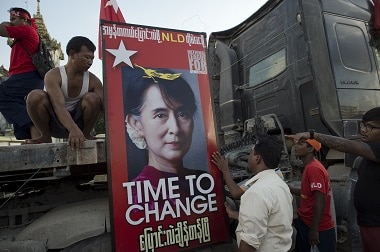Yangon: More than 30 million people are eligible to vote in Myanmar’s election on Sunday, a poll that could redraw the political landscape of a nation smothered by decades of junta rule. Here’s what you need to know about the coming election. How significant is the election? 8 November offers Myanmar voters their first – and potentially freest – chance to have a say in their nation’s future. For decades, Myanmar was ruled by an isolationist junta that killed and jailed its opponents. [caption id=“attachment_2497462” align=“alignleft” width=“380”]  Supporters of Aung San Suu Kyi’s National League for Democracy (NLD) set up a stage outside the main train station ahead of a rally in Yangon. AFP[/caption] The military’s so-called Burmese Way to Socialism turned a once a booming economy into a basket case as an elite got rich while pushing disastrous economic policies onto the nation. Aung San Suu Kyi’s National League for Democracy is expected to make major gains, but it is far from certain it will win an outright majority. Whatever the outcome, there is still a long way to go until the country becomes fully democratic – the army is granted 25 percent of parliamentary seats under the constitution. How did it come about? In 2011 the junta ceded power to a reformist Union Solidarity Development Party (USDP) administration led by ex-general Thein Sein. Observers say Myanmar’s generals were motivated to open the country to halt economic disintegration. But they planned the route to “disciplined democracy” carefully, passing a 2008 constitution that ring-fenced the role of the military in parliament and barring Suu Kyi from the presidency. In 2010 the generals released Nobel Peace Prize winner Suu Kyi from years of house arrest after flawed elections. The USDP government, which released hundreds of political prisoners and restored many freedoms, was rewarded with the lifting of most Western sanctions. International investors flooded into the virtually untapped market. President Thein Sein insists he supports Myanmar’s democratic development and has vowed the election will be free and fair, making the polls the clearest test yet of reform. But Suu Kyi has accused the government of backsliding on reforms, a fear echoed by many international observers. Will it be free and fair? That very much remains to be seen. Myanmar’s military rulers have never held a free or fair election. For the first time, overseas observers will be allowed to monitor the vote and the international community is heavily involved in the poll logistics. Major election fraud would cast a shadow over reforms and raise questions over whether the military are serious about democracy. Tens of thousands of ethnic Rohingya Muslims in Rakhine State have been disenfranchised, while election authorities have cancelled voting in dozens of townships in war-hit borderlands. Both issues are potential flashpoints in the election aftermath. Who will win? Some 30 million people are expected to vote for more than 6,000 candidates standing for 91 different political parties. There are 323 seats up for grabs in the lower house and 168 in the upper house. A further 110 seats in the lower house and 56 in the upper are reserved for military appointees. For an outright majority over the combined parliament, the NLD need to win at least 330 – or 67 percent – of the contested seats. The USDP has an automatic head start because of its links with the army. It needs just 33 percent of the seats to combine with the military bloc. NLD supporters may not stomach anything less than clear victory after years of struggle for democracy. But a strong result from ethnic parties could dilute the party’s majority. Observers expect months of political horse-trading after the poll in the run up to a parliamentary vote to select a president early next year. What happens next? Whoever reaches a majority can expect to form a government. The next step will be to choose a president, but it is a deliberately messy process established under an army-scripted constitution. The lower house, the upper house and the military offer up preferred candidates, with the winner elected by lawmakers. At the moment President Thein Sein has not ruled out standing, making him a likely military-backed candidate. Suu Kyi is forbidden from taking the top spot because the charter disbars candidates with foreign born offspring – her two sons are British nationals. The NLD has yet to give any hint who its preferred candidate will be, although Suu Kyi has promised it will be a civilian NLD member. Nonetheless, Suu Kyi has made no secret of her determination to “lead” the government if the NLD wins. It is unclear how the military will react to this. AFP
More than 30 million people are eligible to vote in Myanmar’s election on Sunday, a poll that could redraw the political landscape of a nation smothered by decades of junta rule.
Advertisement
End of Article
Written by FP Archives
see more


)

)
)
)
)
)
)
)
)



